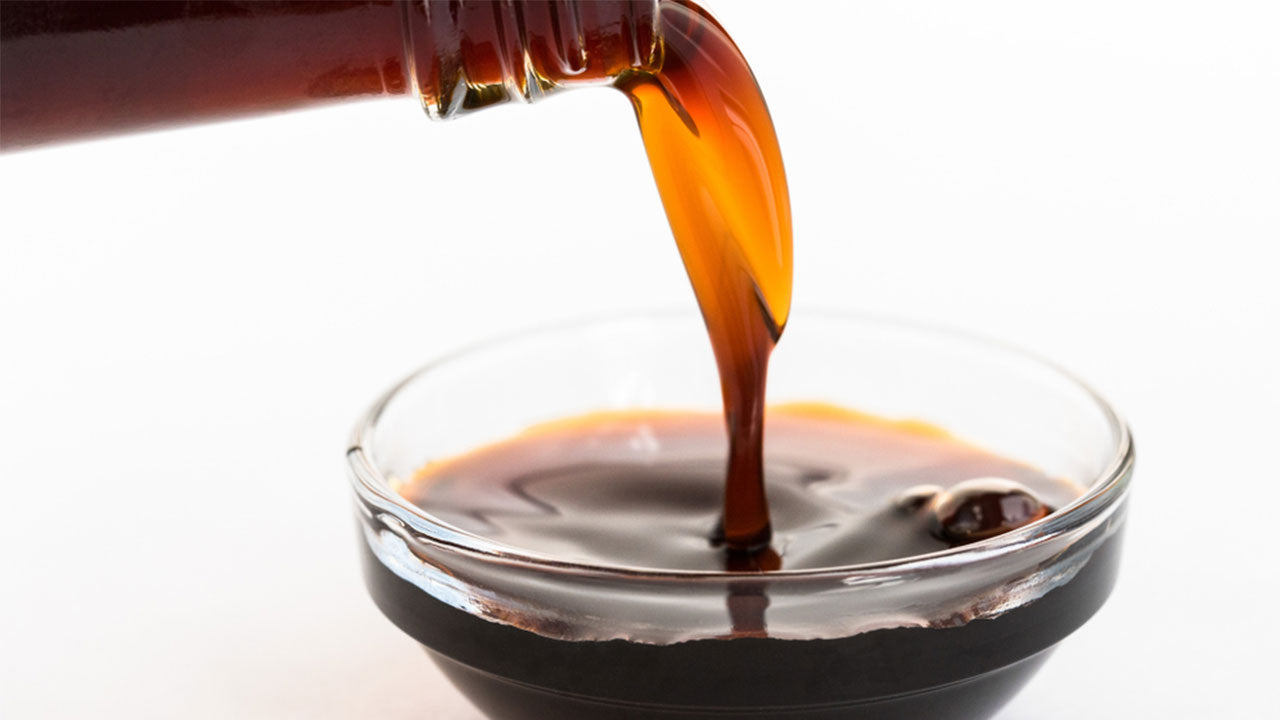The Benefits of Coconut Aminos
 By: by Amino Science
By: by Amino Science

Find out what are coconut aminos, why some people use them to replace soy sauce, how to get them, and how to use them. We're also dishing on the health benefits of coconut aminos, which are pretty impressive!
What Are Coconut Aminos?
Coconut aminos are sold as a liquid condiment, a dark sweet-and-salty product that is often used as an alternative to tamari or soy sauce. With low salt and low glycemic contents, coconut aminos are also vegan, gluten free, soy free, and full of amino acids as the name suggests.
A favorite among those eating a paleo diet or dealing with a gluten sensitivity or celiac's disease, coconut aminos are actually a great product for anyone who wants to avoid the high salt content of soy sauce.
Coconut aminos, unlike coconut oil, are made by fermenting raw coconut-blossom nectar (sap) with mineral-rich sea salt. From those unopened flowers come a wide array of products, including alcohol, vinegar, syrup, sweeteners, and coconut aminos. Coconut sap needs no additives to ferment, as it naturally has all the right yeast, sugar, and bacteria. It ages from a milky white color to a dark brown, and then is mixed with sea salt for flavoring.
A natural whole food with B vitamins, vitamin C, and 17 amino acids (including all nine essential amino acids required for new muscle growth), coconut aminos have a lot to offer.
Are Coconut Aminos Healthier Than Soy Sauce?
If coconut aminos still contain salt, how is coconut amino liquid healthier than soy sauce? Though coconut aminos do come with sugar and salt, as a soy sauce alternative they have less sodium per gram. A 5-gram serving of coconut aminos yields 5 calories, 1 gram of carbs, zero fat, and about 73% less sodium than soy sauce does. That's roughly 113 milligrams of sodium per serving, just 5% of the recommended daily value.
Coconut aminos also have a low glycemic index number, which ranks foods based on how they impact blood sugar levels. At a 35 on the glycemic index, coconut aminos are a much healthier choice for those with diabetes, and for maintaining healthier blood sugar levels over all. Coconut amino seasoning sauce in Asian food recipes like fried rice is better than soy sauce in a few more ways.
- Soy sauce can come fermented or unfermented. Fermented soy sauce offers the benefits of probiotics, but unfermented does not, and often contains wheat (a problem for those with food sensitivities to gluten).
- A lot of soy sauces are genetically modified (GMO) products, the health effects of which are not fully known, and may cause allergies in children.
- Soy sauce contains monosodium glutamate (MSG), which can cause weakness, muscle pain, and headaches in those who are vulnerable to its affects.
- A high-sodium diet can have a dangerous impact on anyone's blood pressure, and with 73% more sodium in soy sauce than coconut aminos, it's safer to go with the low sodium option.
For those reasons, many people are saying goodbye to commercial soy sauces and hello to the gluten free, sustainable, and organic coconut amino alternative instead.
 The Benefits of Coconut Aminos
The Benefits of Coconut Aminos
While coconut aminos have not been extensively studied, coconut sap has, in both its fresh and fermented form. That research provides the following beneficial credits.
Amino Acid Content
Amino acids not only make up all the protein in your body, but are also responsible for hormone synthesis and regulating your immune function and response. With 17 essential (all the essentials in fact!) and nonessential aminos, coconut aminos provide you with the building blocks of protein and more.
If coconut aminos don't satisfy your palate, then you can always up your intake of essential amino acids with a daily essential amino acid supplement.
Probiotic Digestion Aid
Fermented foods like kefir, kimchi, and coconut aminos improve your gut's bacterial content by adding more good bacteria into the mix, and coconut aminos provide an organic probiotic boost to the health of your gut flora. Scientifically shown to benefit digestion and help decrease the symptoms of allergies, probiotics are a healthy choice.
One of the commonest fungal infections in modern times is candidiasis, resulting from a bacteria that tends to overgrow in our digestive tracts and is responsible for symptoms like bloating, gas, nausea, and diarrhea. The lactobacillus contained in coconut aminos helps to inhibit fungal candida albicans, reducing the likelihood that it will overgrow and cause harm to its host (us humans).
An MSG- and Gluten-Free Alternative
Those with a sensitivity to MSG, which is often added to soy sauce, can use coconut aminos instead. MSG has been shown to exacerbate migraine headaches, increase blood pressure, and negatively harm the human body. Moreover, as coconut aminos are gluten free, it's a safer and healthier alternative for many, especially those who suffer from celiac disease and cannot ingest gluten whatsoever without severe consequences.
How to Use Coconut Aminos
What might you use soy sauce for? That is where coconut aminos can sub in perfectly. From a sushi dipping sauce to a marinade to salad dressing, coconut aminos have the same consistency and a similar taste to soy sauce and pair well with any Asian culinary dish. A vegetable stir fry with 73% less sodium? That's an extremely healthy and easy way to use a soy sauce substitute.
Coconut Aminos: Dietary Restrictions and Allergies
Even better, because coconut aminos are so allergen-free, they fit into any healthy diet, from the Whole30 diet, to the keto diet, to paleo and AIP diets, vegan and vegetarian diets, gluten-free diets, and the Candida diet (designed to prevent bacterial overgrowth). Whatever your restrictions or dietary choices, you can rely on coconut aminos.
The same cannot be said about tamari though, so for those still deciding between tamari vs. coconut aminos in the great soy sauce replacement debate, tamari products are not always 100% gluten-free. Though it's made without the roasted grains of soy sauce, you'll have to check tamari's label every time to make sure there is no wheat in use at any stage in the process. Also for those with soy allergies, it's a no-go: tamari is still the end result of fermented soybeans.
So in the end, if you're looking for a soy-free seasoning sauce that won't disrupt your carefully kept diet, you're probably looking for coconut aminos. That goes the same for coconut aminos vs. liquid aminos: liquid aminos are made by treating soybeans with an acid that breaks down its proteins into amino acids, and while it (like coconut aminos) is a gluten-free product, it still has soy, and a lot more sodium per serving size to boot. A teaspoon of coconut aminos comes with 90 milligrams of sodium, while liquid aminos have 320 milligrams per teaspoon—that's even higher than many traditional soy sauces.
Side Effects
Good news: there are no reported adverse side effects to consuming coconut aminos. Short of being allergic to coconuts, coconut aminos are safe to welcome into your diet and have no noted interactions with any medications whatsoever.
Go Loco for Coco Aminos
For an alternative to soy sauce that's sustainable, organic, soy free, gluten free, vegan, kosher, and free of MSG, coconut aminos are your ideal answer. Not only will you lose the unhealthy impact of soy sauce, but you'll also gain the probiotic benefits of a fermented food product. While it may be hard to find on store shelves outside of the largest health food chains, you can easily browse the Internet and research the many brands of coconut aminos to find one that fits perfectly to your liking. Look for organic products only, and in a glass bottle that you store in the refrigerator once opened and then enjoy for months to come.

Up to 25% off Amino
Shop NowTAGS: food
Join the Community
Comments (0)
Most Craveable Recipes




 833-264-6620
833-264-6620



















